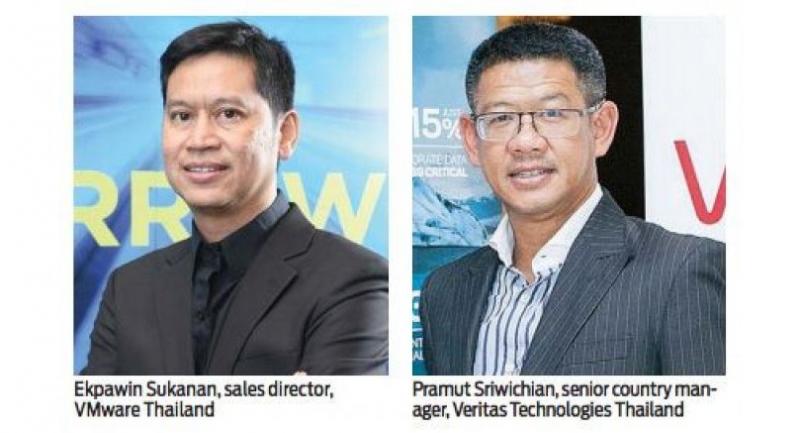Cloud, business mobility in focus this year for Thai IT vendors

Data management solutions, software as a service among key business areas as pace of digital transformation picks up here and elsewhere in region
The ICT (information and communications technology) sector has the potential for further steady growth in Thailand, with cloud and business mobility seen by experts as among the key focus areas for vendors this year.
Pramut Sriwichian, senior country manager of Veritas Technologies Thailand, said the company would concentrate on providing its 360 data-management solutions to help enterprises handle their data needs.
These solutions leverage the market for the Veritas NetBackup product family, extending its reach from back-up and recovery for cloud, virtual and physical environments to become a foundational platform for unified data protection, he said, adding that this would help enterprises to solve increasingly complex IT challenges in the digital environment.
Veritas also has businesses in Cambodia, Laos and Myanmar (CLM), operated under the management of the Thailand team, with the CLM area seen as a high-potential market for growth, as the three countries are investing in ICT infrastructure aimed at improving productivity and connectivity, in order to spur growth.
As one of the untapped markets in Asia, the CLM ICT sector has the potential to grow significantly, after decades of underdevelopment, he explained.
Pramut added that cloud was no longer optional for organisations looking to remain competitive, while the key trends impacting enterprises in 2017 included software as a service (SaaS).
He said SaaS would grow to become an even bigger part of the enterprise software market, as businesses and organisations of all sizes look to consolidate their cloud and on-premises-based business functions and IT strategies.
Vendors that can support both scenarios – and that can help customers navigate and streamline this complex shift – will be winners this year, he predicted.
Amid the continued rise of emerging technologies like software-defined storage, accelerating toward the cloud does not mean that businesses’ storage needs will disappear, he stressed.
Companies will need to be able to manage storage holistically based on real business needs, such as up-time, cost and responsiveness.
Meanwhile, as organisations look for more turnkey-style solutions for managing storage across their hardware, a new generation of software-defined storage will help them align and merge their cloud and on-premises strategies, the senior country manager said.
According to a projection by IDC, the global market-intelligence firm, IT spending in Thailand this year will come in at around Bt415 billion, some 3.7 per cent higher than last year’s level.
Meanwhile, Ekpawin Sukanan, sales director of VMware Thailand, said the company would continue to help businesses achieve agility, flexibility and scalability, and it remained focused on enabling cloud and business mobility.
Driving business agility
VMware will concentrate on providing software that helps organisations to manage their multi-cloud environments to drive business agility, he said.
This year, VMware has extended its hybrid cloud strategy with VMware Cross-Cloud Architecture, enabling customers to run, manage, connect and secure their applications across clouds and devices in a common operating environment.
This will help organisations reconcile the priorities and objectives of both business leaders and IT decision-makers in today’s multi-cloud landscape, he added.
A new set of Cross-Cloud Services that VMware is developing will enable enterprises to manage, govern and secure applications running across public clouds, including Amazon Web Services, Azure and IBM Cloud.
“Moreover, we also expanded our partnership with IBM and Amazon Web Services to enable easy hybrid cloud adoption for businesses in Thailand,” the sales director added.
Business mobility will also be another area of focus for VMware.
In the mobile-cloud era, employees, devices, applications and data increasingly live beyond the physical walls of the workplace, the data centre or the network, and digital enterprises are struggling to deliver a unified digital workspace due to disjointed technology and teams, he pointed out.
“We continue to support leading organisations such as AIS [Advanced Info Service], EASY BUY, Samitivej Hospital, Betagro, Tisco Financial and the Public Health Ministry to drive their business transformation. Our focus continues to be on our customers, where we remain dedicated in enabling their digital-transformation journey in Thailand,” Ekpawin said.
He added that the shift to digital business models was transforming industries everywhere, pushing businesses, big or small, to innovate faster.
“As a fast-growing cloud market, Thai businesses are now ready to extract greater value to provision their mobile workforce with greater efficiency, reliability and speed.
“Given the strong push for businesses in Thailand to boost productivity, deploying technologies can not only enhance resource efficiencies and cost savings, but also enable businesses to leverage these technologies to automate processes and enable business growth,” he emphasised.
He also said cloud computing would still be a key driver for business transformation in 2017, as businesses in Thailand increasingly recognise that it is key to driving innovation and enabling efficiencies, productivity and cost-reductions.
“We continue to see an increase in the adoption of hybrid cloud strategy by businesses, with IDC forecasting that 70 per cent of enterprises in Southeast Asia will adopt this cloud adoption model,” Ekpawin said.
“Moreover, as the digital economy in Indochina is growing, we will continue to support businesses across Asean, including Indochina, on their IT and business-transformation journey,” he added.
